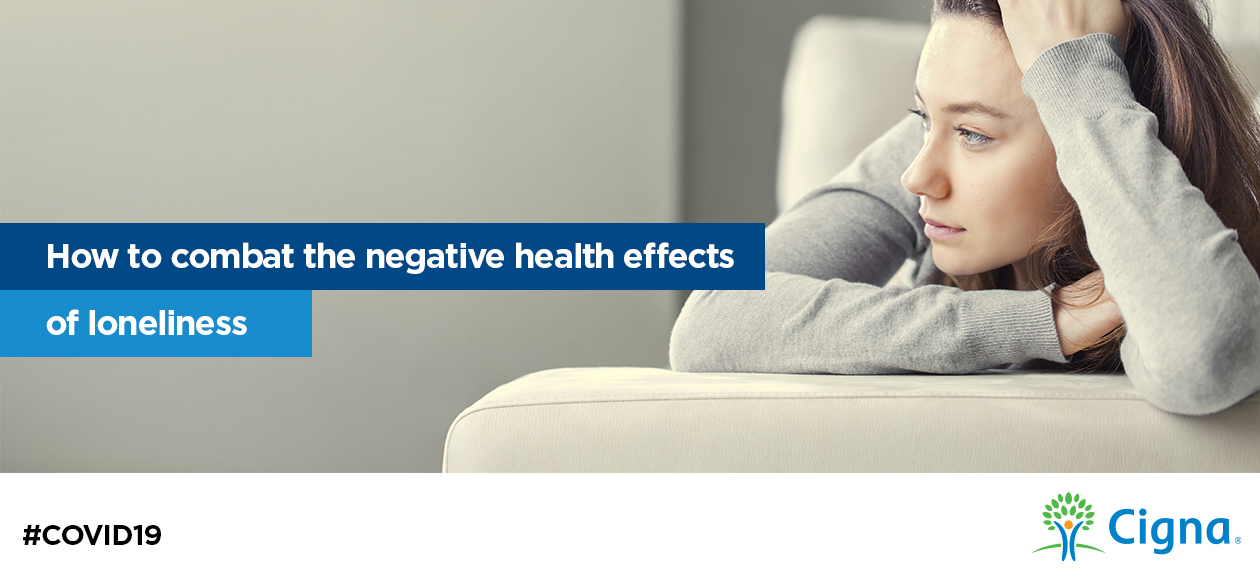The lack of social interaction and face to face contact with friends and loved ones can result in social isolation, which in turn can lead to a number of health issues and feelings of loneliness. Long-term loneliness can manifest in many ways, both physically and psychologically, which in turn can result in increased anxiety levels.
Loneliness can affect anyone however vulnerable people are most at risk, including those who live alone and elderly people. This places them in a position of double vulnerability - they are vulnerable against the pandemic and they are vulnerable against loneliness.
As Peter Mills and Inge Schrever, doctors responsible for the Cigna Europe medical team, highlight, “Feelings of loneliness can happen because of many factors, however in this current period of social isolation, it most frequently arises because of the forced separation from those we love, or due to the lack of social connections with other people. For this reason, it’s important to bear in mind that, despite the fact that it is a temporary phenomenon, solitude during the isolation period can, without question, significantly reduce our quality of life, negatively impacting our health and well-being, especially among the most vulnerable groups”.
As Dr. Mills and Dr. Schrever further indicate, “Although the seriousness of the situation is undeniable, the good news is that, by applying certain guidelines, we can help curb the feeling of loneliness, so that our health and wellbeing are not affected during this period. Leading a healthy lifestyle or using technology to feel closer to family and friends is a good starting point, as well as maintaining a positive attitude, knowing that through isolation, teleworking and the preventive measures in action, we are doing our bit to slow the spread of the virus, helping to improve collective health."
Thinking positively and sustaining a positive mind set is crucial. Health service provider Cigna Europe, recommends a number of ways to limit the impact of loneliness on our health and well-being:
- Avoid negative thoughts. Constantly thinking about the negatives associated with isolation can worsen emotional distress. Accepting the situation is the first step in controlling our emotions and minimising the chances of feeling lonely.
- Use technology to create emotional connections. Social relationships are essential for both our physical and mental health. Now it’s more important than ever to maintain regular contact with our social circle. This can be done via video calls, instant messaging or phone conversations. However, we must use these means in a healthy way - avoid placing the COVID-19 at the centre of all conversations, and try to talk about other things that will help distract us.
- Practice meditation techniques. Mindfulness or conscious breathing can become great allies to calm anxiety and reduce stress. Breathing and meditation exercises can even help delay the ageing of our brain, helping the immune system react more strongly in the production of antibodies.
- Maintain a certain level of physical activity. Physical exercise helps release endorphins in the brain, so if a certain level of activity is maintained during this period, the production levels of these hormones will remain high. There are many online resources available to help you exercise safely at home, whatever your fitness level.
- Watch your diet - it’s essential to improve our mood. Since approximately 95% of serotonin - the hormone that works as a neurotransmitter and regulates sleep, appetite, and mood - is produced in the gastrointestinal tract, a balanced diet will be essential to cope with loneliness, as indicated by Harvard University1. In this way, eating more foods such as white meat, eggs, pulses, whole grains, nuts, seeds, bananas or dark chocolate, always within the limits of a balanced diet, will contribute to improving our mood.
- Communicate regularly with colleagues. Adjusting to working from home can impact people’s emotional well-being as the work environment is often a place for social-interaction. For this reason, it’s important to continue maintaining regular communication with colleagues, either by phone, email or videoconference.
- Get some sun, if possible. Sunlight strengthens our immune system and improves our mood, as it stimulates the synthesis of vitamin D, a key substance for the central nervous system that helps control depressive symptoms. Sun exposure should last between 10 and 20 minutes a day.
- Establish a routine with regular sleep schedules. It‘s important to set schedules and maintain routines, especially in regards to hours of sleep, eating and physical exercise. The longer we are busy, the lesser room for loneliness.
SOURCES
1 – Nutritional psychiatry: Your brain on food. University
of Harvard.
Link.
About Cigna Europe
Cigna (NYSE: CI) is a global health service company
dedicated to helping people improve their health,
well-being and peace of mind. Cigna Europe has more than
60 years of experience in designing, implementing and
managing international group health insurance and employee
benefits programmes for domestic and international
recruited staff from European corporations, International
Organisations (IGO & NGO) and governments. We also
provide healthcare for globally mobile individuals.
To support its European and Global Segments customers,
Cigna Europe has dedicated offices in the United Kingdom,
Belgium, Spain, Kenya, Dubai, the United States and
Malaysia. Over the years, we have acquired an in-depth
understanding of the daily challenges faced by domestic
and international organisations, and their staff members
in managing their health and well-being.
